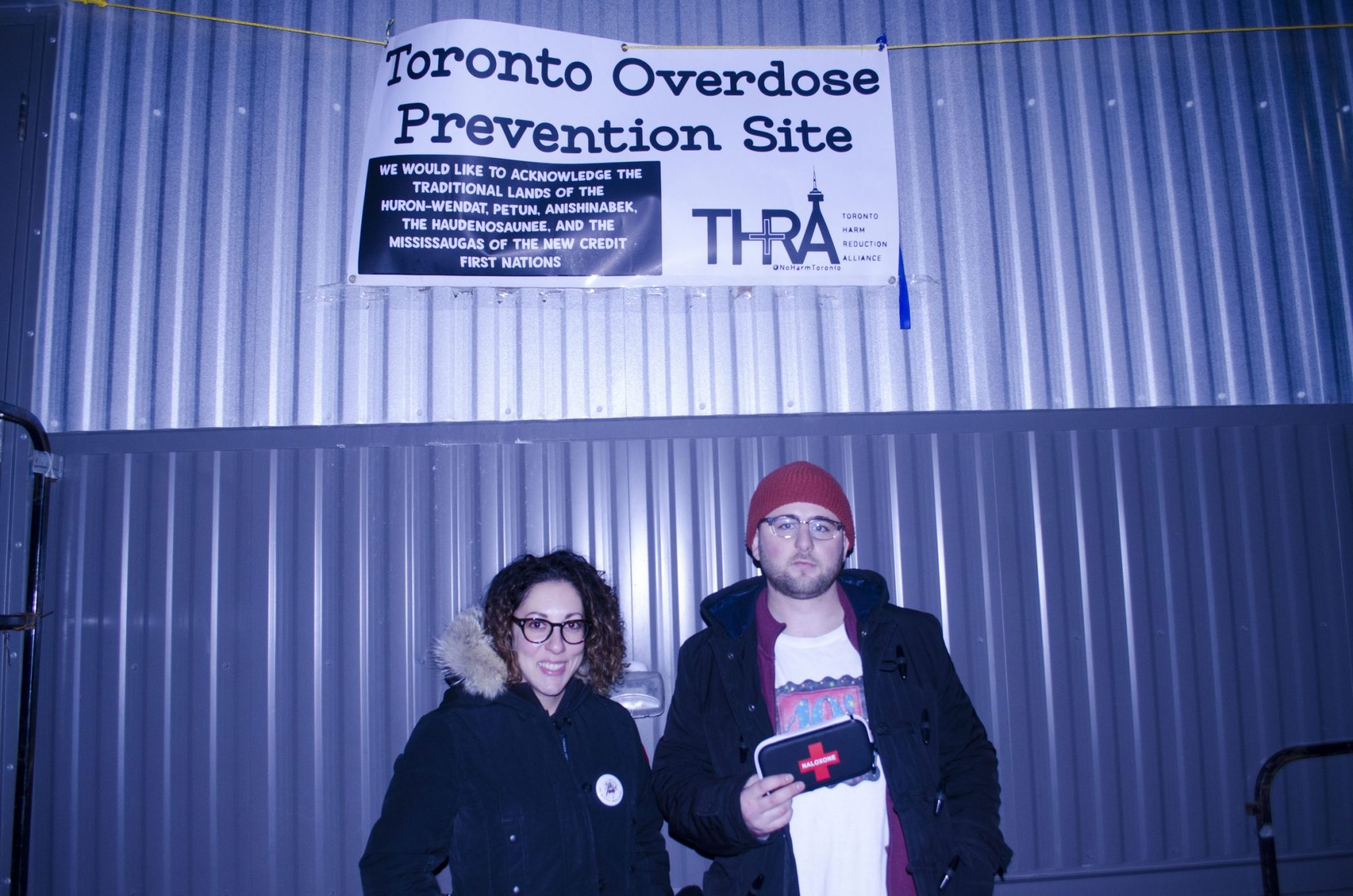Zanna Seipp-Katz moved to Toronto 10 years ago to pursue acting, but her plans quickly changed. She went back to school and studied the only thing she knew more about than performing — addiction.
“I’ve used drugs from the age of 12 to the age of 21 and I had a really hard time with that. I personally haven’t used drugs in 12 years,” said Seipp-Katz, 33, who is originally from Winnipeg.
“I have no idea how that happened. I look back and I have no idea how I was able to do that but I understand the struggle and I understand the lack of support.”
Seipp-Katz graduated in October with a bachelor’s degree in social work. She is one of 150 volunteers at the unsanctioned safe-injection site in Moss Park, which was opened in August by Toronto Overdose Prevention Society and the Toronto Harm Reduction Alliance.
The site, which now sits in a trailer, is a place where drug users can safely inject or use drugs. Guests are supervised by volunteers. Naloxone kits, which temporarily reverse the effects of an opioid overdose, are kept close by.
“The trailer we’re currently using has been donated through CUPE and the volunteers [and] financial donations have all come from the community across Toronto and from outside of the GTA,” said Aaron Woznica, 26, a harm-reduction worker who volunteers at the site.
The site has been run without government support, Woznica said, with the exception of it not being raided by police.
More than 120 overdoses have been reversed at the site.
“Since we’ve opened up, overdoses have gone down and we have been able to manage them and catch them before folks really go down,” Woznica said.

Opioid-related deaths in Canada are expected to hit 4,000 by the end of 2017.
The Public Health Agency of Canada said that 1,460 people across the country died from opioid-related deaths in the first half of 2017. The report predicts numbers will reach 4,000 by the end of 2017. Ontario alone experienced a 68 per cent increase in opioid-related deaths this year over last year, according to the provincial health minister and coroner.
The Moss Park project has ruffled feathers at Toronto’s city hall. Concerns include the perception that safe-infection sites enable addiction and increase crime. However, a recent study of a safe-injection pilot site in Vancouver came to the opposite conclusion.
“Without overtly bashing any politician, what I will say is that what we’ve done here has been in spite of all three levels of government and not because of them,” Woznica said.
Volunteers face difficult situations being on the frontlines of the opioid crisis. One of the site’s founders, Zoë Dodd, established a frontline support workers group to assist volunteers with their mental health needs.
For Seipp-Katz, the site means something else for her wellbeing.
“I needed to be here for my mental health. This is where I needed to be,” she said.
“This is kind of almost self care in itself, it’s taking care of the part of me that makes me feel like I’m doing something and I’m making a difference.”
For “defying apathy and the law,” and for saving lives, the volunteers at the Moss Park supervised injection/overdose prevention site are our Torontonians of the Year. pic.twitter.com/oFCcZ2oYEj
— Metro Morning (@metromorning) December 21, 2017
Despite the site’s controversy, both Woznica and Seipp-Katz said that the community has been supportive of volunteers and guests.
“The Sunday night of Thanksgiving I didn’t know how donations would go. We had pretty frequent donations and some days were better than others but I figured it’s Thanksgiving and people are going to forget about us,” Seipp-Katz said.
“About half an hour [or] 45 minutes into the shift it was like a parade of people coming from all over the park with loads of food . . . We had no space to put all the food.”
There were 2 garbage bags full of homemade hand knit scarves left at our site today. This kind gesture just reduced us to tears! We are feeling the love @TorontoOPS @ZoeDodd @NoHarmToronto For our lovely holiday gift bags for folks on the 25th. 🙏 pic.twitter.com/vGVwqHu1C9
— Toronto OPS (@TorontoOPS) December 20, 2017
Seipp-Katz said that the site receives a lot of repeat guests and often friendships are made. She doesn’t mention her own experience with drug use unless it comes up naturally.
“I feel like I have a different perspective, the thing is that when you look at someone you don’t know their story,” Seipp-Katz said.
“People have a perception of what a drug user looks like, I think that’s a big problem with society.”

